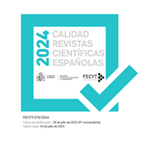¿Cómo afecta la cultura a la gramática? El caso de los clíticos en el español americano
Resumen
La sintaxis de una lengua se halla motivada semántica y pragmáticamente. La dimensión pragmática establece qué formas lingüísticas —y sus significados— son más apropiadas para qué contexto. En este trabajo intentamos mostrar cómo el lenguaje es modelado por la cultura cuando lo pragmático es etnopragmático. Los sesgos en la frecuencia relativa de uso de los clíticos de tercera persona en distintas variedades del español americano constituyen un ámbito adecuado. La naturaleza deíctica de los clíticos del español hace que se pongan en juego al menos dos tipos de dimensión pragmática: la dimensión referencial y la dimensión relacional. El valor que cobra la referencia es, ciertamente, cultural, asignado por la comunidad. En efecto, es esperable que diferentes grupos culturales asignen diferentes valores a los mismos referentes y que estos valores culturales influyan en la conformación de los paradigmas de la lengua. Ejemplificaremos la propuesta mediante la observación de la expansión del empleo de le y la ausencia del clítico en el campo de los acusativos en el español guaranítico argentino y del uso categórico y variable de los clíticos respecto de algunos verbos en el español de bolivianos residentes en la Argentina.Descargas
Descarga artículo
Licencia
La revista Círculo de Lingüística Aplicada a la Comunicación, para fomentar el intercambio global del conocimiento, facilita el acceso sin restricciones a sus contenidos desde el momento de su publicación en la presente edición electrónica, y por eso es una revista de acceso abierto. Los originales publicados en esta revista son propiedad de la Universidad Complutense de Madrid y es obligatorio citar su procedencia en cualquier reproducción total o parcial. Todos los contenidos se distribuyen bajo una licencia de uso y distribución Creative Commons Reconocimiento 4.0 (CC BY 4.0). Esta circunstancia ha de hacerse constar expresamente de esta forma cuando sea necesario. Puede consultar la versión informativa y el texto legal de la licencia.











